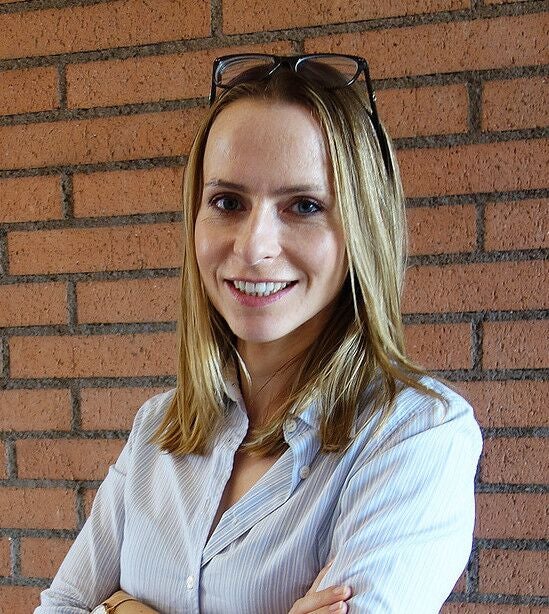Center for Advanced Genocide Research Awards 2017 USC Graduate Student Research Fellowship to Maria Zalewska
As the 2017 Graduate Summer Research Fellow at the USC Shoah Foundation Center for Advanced Genocide Research, Zalewska has focused her energy on a new research project: “Digital Topography of Memory: Reimagining Landscapes of pre-Holocaust Poland.” The project engages with the Institute’s Visual History Archive by comparing the memories of the pre-World War II spaces in which Poles and Jews interacted in testimony with their cinematically narrativized counterparts.
“By juxtaposing the archival testimonies with post-World War II documentary films, I begin to theorize different levels of spatial imaginings and collective encounters with the memory of pre-Holocaust Poland,” Zalewska said. “I investigate the way the pre-Holocaust landscapes were first imagined, experienced and co-produced by their Jewish inhabitants and then reimagined by the Polish inhabitants. I ask, how is the artistically rendered memory of pre-Holocaust space different from the one we know from survivors’ testimonies?”
To narrow her research, Zalewska specifically looks at the eighteen villages and towns scattered throughout the Polish countryside that are portrayed in the documentary film Po-Lin (2008), by Jolanta Dylewska. In this film, Dylewska recorded interview with the last of the witnesses of pre-Holocaust Poland and presented an image of peaceful cohabitation of two existing cultures.
“Central to my research is a consideration of the relationship between witness and survivors’ testimonies to culturally and industrially charged cinematic historical narratives that are indicative of a public discourse at large,” Zalewska said. “I ask, how has contemporary Poland cinematically negotiated its own geography and history of indifference, apathy and – often – anger directed at their Jewish neighbors? Are the two memories of the pre-Holocaust space in stark contrast to one another?”
USC Shoah Foundation’s Visual History Archive – a collection of 54,000 digitized and fully searchable video testimonies from survivors and other eyewitness of the Holocaust, the Rwandan, Guatemalan and Armenian genocides and the Nanjing Massacre in China – has helped Zalewska reimagine the landscapes of pre-Holocaust Europe, which she has studied for some time.
After receiving her M.Phil. in Russian and Eastern European Studies at the University of Oxford, Zalewska moved to Poland and became the director of the Warsaw office of the Auschwitz-Birkenau Foundation, a non-government organization supported by the Polish government that raises funds to preserve the Auschwitz-Birkenau Memorial and State Museum.
Since then, she’s worked with the Foundation as a volunteer and in her matriculation to USC, has combined her academic interests with her professional experience working to preserve the memory of the Holocaust.
Her Ph.D. dissertation project “#Holocaust: Rethinking the Relationship Between Spaces of Memory and Places of Commemoration in the Digital Age,” examines how new technologies are used and applied to various commemoration projects, how they impact attitudes toward the past and how they re-shape the memory of the Holocaust at a time when the last witnesses are becoming history themselves.
“By engaging with transnational modes and media of memorialization as well as digital spaces,” Zalewska said, “I pose a question: does physical space still matter in the digital age?”
One of the case studies her dissertation engages with is the Institute’s Visual History Archive, which she has followed closely since she became seriously interested in Holocaust studies in 2009.
“The vastness of this repository of memory has left a big impression on me,” Zalewska said. “These testimonies save from oblivion the memory of those who survived the Shoah. They remind us of the most positive aspects of human spirit and resilience, while also bearing witness to the horrors and worst examples of man’s inhumanity.”
With help from USC Shoah Foundation’s staff, Zalewska has found plenty with which to complete her research project.
“I could not praise the staff of USC Shoah Foundation enough,” Zalewska said. “This fellowship allowed me to meet and engage with a group of some of the most inspiring and inspired specialists in the field of memory and genocide research I have ever met. I am thankful for fascinating educational conversations with the director of the Center for Advanced Genocide Research, Dr. Wolf Gruner, and I remain grateful and impressed by the professionalism, courtesy and assistance I’ve received from Martha Stroud, research program officer, and Crispin Brooks, curator of the Visual History Archive.”
The busy researcher’s next endeavor is a new project entitled “Pokemon in Auschwitz: New Encounters Beyond Augmented Reality Technologies, Spaces of Memory and Places of Commemoration.” It will analyze the summer 2016 phenomenon of Pokemon Go and the controversy of catching Pokemon in Auschwitz-Birkenau. She will be presenting this research at the Center’s upcoming international conference “Digital Approaches to Genocide Studies.”
